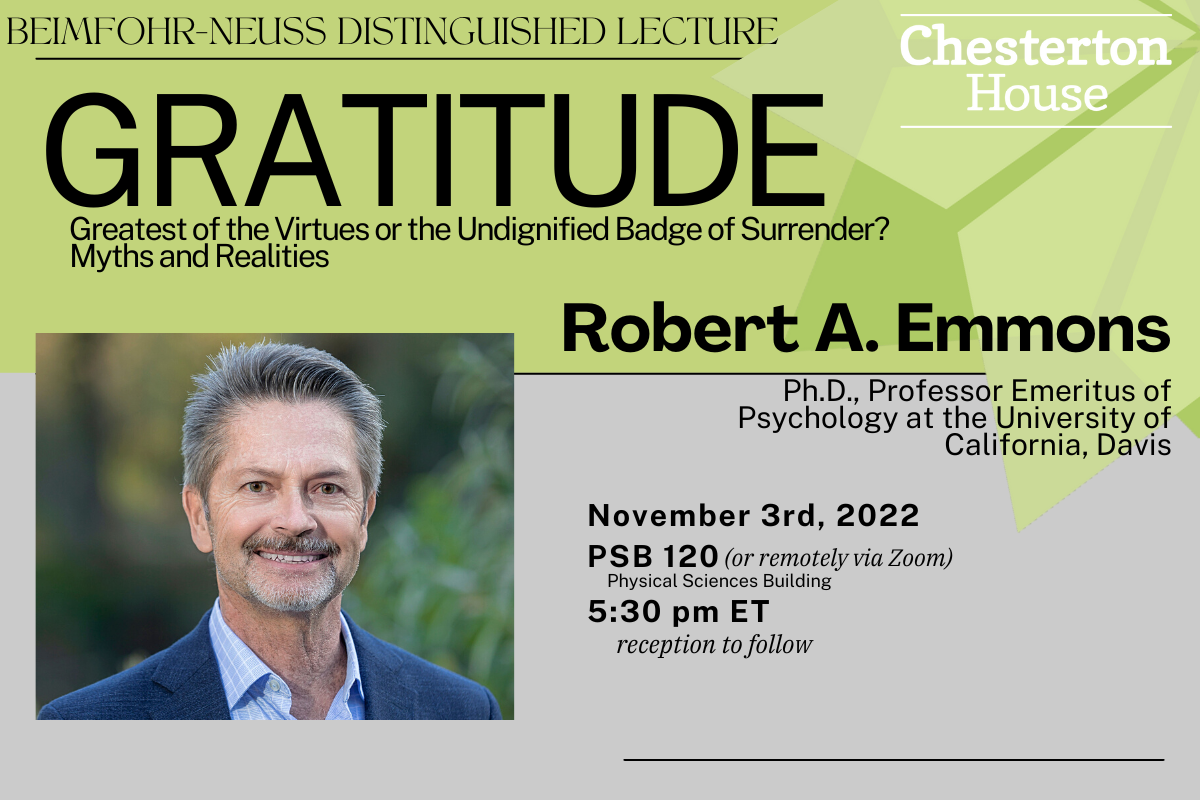
- This event has passed.

Date
November 3, 2022 at 5:30 PM EDT
Location
120 Physical Sciences Building
Speaker
Robert A. Emmons, Ph.D.
Beimfohr-Neuss Distinguished Lecture
*Registration not needed if attending in person
Gratitude: Greatest of the Virtues or the Undignified Badge of Surrender? Myths and Realities
In the history of ideas, gratitude has few rivals. Praised for its capacity to energize, elevate, and heal, gratitude is celebrated as key to flourishing lives and societies, an indispensable element of the good life. Yet a closer examination reveals its potentially complicated nature. In contemporary life, the energy of activism and complaint against social injustice has an uneasy tension with gratitude, contending that it is an obstacle to vital social change and a plot to maintain an unjust social order. Is there a dark side to gratitude that undermines its ability to lead us to better lives and a better world, and to create a just and civil society? If gratitude is problematic, in what sense can it be said to serve as a global healing force in modern times? Can recent scholarship in the sciences and humanities provide insights into these and other perennial questions? As one of the more durable features of human existence, gratitude both demands and requires a careful and balanced examination.
Robert A. Emmons, Ph.D., Professor Emeritus of Psychology
at the University of California, Davis
Robert A. Emmons is Professor Emeritus of Psychology at the University of California, Davis where he has taught since 1988. He received his Ph.D. degree from the University of Illinois at Urbana‑Champaign. He is the author of over 250 original publications in peer‑reviewed journals or chapters and has written or edited eight books, including The Psychology of Ultimate Concerns, Thanks! How Practicing Gratitude Can Make You Happier, and The Little Book of Gratitude. A leader in the positive psychology movement, Dr. Emmons is Founding Editor and Editor-in-Chief of The Journal of Positive Psychology. His research focuses on the psychology of gratitude and joy as they relate to human flourishing and well-being. A frequent speaker at professional conferences and public events, Dr. Emmons has guest lectured at Yale, Oxford, Stanford, and the University of Michigan. He has been PI or Co-PI for over $15M in research funding from the National Institute of Mental Health, the John M. Templeton Foundation, and the National Institute for Disability Research and Rehabilitation. His ground-breaking work on gratitude has been featured in dozens of popular media outlets including the New York Times, USA Today, U.S. News and World Report, Newsweek, Time, NPR, PBS, Consumer Reports, Wall Street Journal, Forbes, and the Today Show. He is a trustee of the Templeton World Charity Foundation.
